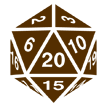Yolbiac Vale
The Yolbiac Vale is a dark and forested realm, barely populated, ruled by independent barons and a scattering of local nobles claiming higher status than baronial. Villages are far apart, roads are dangerous, peasants are secretive, and dangers lurk in the omnipresent forests. The people of the Yolbiac Vale are considered to be strange and unpredictable.
The vale is a deep indentation in the middle of the Cretian Mountains that runs from Coelum to about a hundred miles south of the town of Elet. It has several wide river valleys extending to the west that curl into the deep heart of the mountains. The strange folk of the Yolbiac populate these remote areas. The territory comprises approximately 22,000 square miles. The majority of the region is heavily forested, but not with a single, contiguous growth of trees. Instead, the region has many primordial forests that run five to 10 miles across. Ridges of stone, or infertile ground, divide the forests, for this is high and broken terrain.
The Gurmenadh possesses blackest bark, And Olcabar the Deep is dryad-marked. Nevezeld holds close its standing stones, And Grim Canoct shall hoard its whitened bones. Beware the Wargenwold of Tamril Shee; Wear green in Lengis Lorme of restless trees. In Faunwood Fey the wildest satyr’s pipe, While murderous fruits in Mouldenarc grow ripe. The Father Forest, first that ever grew Is the primeval wild of Scal Farnu. — Ending stanzas of the “Teaching-Rhyme of the Druids of Leagan Cairn” The translator’s note to the “Teaching-Rhyme,” by the scholar Nonadh Bleyir, reads as follows: “In the cant of the druids, the iambic pentameters of the “Teaching-Rhyme” contain a number of nuances and double-meanings that do not translate well into the common tongue. Moreover, each of the stanzas has a sub-poem associated with it; I must confess that my understanding of the cant proved insufficient to convey the interwoven implications of any of the sub-poems, and I have abandoned the task of translating these.”As the teaching rhyme suggests, the great forest of the Scal Farnu is a dominating feature in the Yolbiac Vale. Irregularly shaped, it has long, narrow extents that most certainly shift their locations by several miles each lunar month beneath the waning gibbous moons. Common folk avoid the Scal Farnu, not because it is inherently deadly as with the Mouldenarc, but because strange and unpredictable things — often life-changing — happen in the forest. Such events are by no means always maleficent, but peasants are conservative folk and choose not to risk the shifting pathways that entice travelers into the shadowy, green depths of the Scal Farnu. The Scal Farnu is said to contain the manse of Hautmarlune, a mysterious archmage. It is also thought to contain the sacred groves of the druidess Rowena of the Hounds (as distinguished from the famous Rowena of Greatstone Cairn). Two supernatural hounds, Aubrei and Simain, prowl the forest, apparently immortal beasts that may guide a party of lost adventurers back to the safer paths if they follow. The hounds travel separately, and mortal weapons and magic cannot harm them. They are patient and not vindictive, but they depart if attacked, melting away into the trees. According to legend, these are the hounds of Rowena, but none knows for certain. In the deepest forests of the lower peaks surrounding the vale are known to dwell a reclusive tribe of wood elves known to the Valefolk only as the Eldest. What tragedy or turmoil this people may have suffered in the past is not known, but they are seldom seen by the folk of the vale and when they are spotted, they remain distant and quickly disappear into the trees. Attempts to make contact with them have universally met with stony silences and hasty withdrawals, but so far they have shown no inclination over the years for hostilities toward the humans of the vale. To most of the Yolbiac’s inhabitants, they are simply one more evidence of the vale’s fey nature. Hints at a tragic history of these elven folk can be found, however, in the few elven ruins in the lowland parts of the valley and in the unusual preponderance of groaning spirits that are known to haunt some of the surrounding mountain slopes.
History and People
The Yolbiac Vale is a land of dark alpine forests, independent villages, isolated abbeys, bizarre superstitions, and strange perils. Its people are widely varied in attitudes and customs, for few of them ever leave the environs of their home villages. Such wanderers are highly suspect, and even though they bring back fascinating news and tales of other villages, they might be doppelgangers or shape-changed faeries. It is best to always be careful; some returning travelers merely receive a sound thrashing before being sent back on their way.
Events in the Yolbiac Vale proceed unchanged since time immemorial. Stories accumulate and are forgotten, heroes live and heroes die, strange and supernatural events occur, others are warded off by the proper hand gestures and taboos. Darkness abides, and life goes on. Such is the Yolbiac Vale.
Trade and Commerce
The Yolbiac region produces many strange commodities such as a variety of dark-purple apples that induce strange dreams and a dark grape, almost black, from which they ferment a potent, bitter wine that stains the lips and teeth of those who indulge frequently. Fey items are often brought down from the vale and include twists of hair or painted sticks that have magical powers, or finely chased goblets of hypnotic beauty. Purchasers of such items are cautioned; occasionally, their original owners imbued them with unanticipated consequences.
The vale may be reached either through the Coelum Pass in the Duchy of the Rampart or by the Ghostwind Pass near Elet in Aachen Province. During the summer months, there is a considerable amount of trade with the folk of the Yolbiac Vale, but when the winter snows set in, they are left to themselves. The Ghostwind Pass is completely inaccessible during the depths of winter, and the Coelum Pass is treacherous at best.
Loyalties and Diplomacy
Outsiders consider the Yolbiac Vale to be an annex of Foere, but it is strangely ignored and appears to have no ruling authority whatsoever. As such, the vale cannot be said to have any loyalties to, or diplomacy with, other nations. At one point, a baron of Aachen Province led a small army into the Yolbiac with the intention of seizing a fiefdom, but there is no historical record of the event beyond the army’s departure from Elet.
Government
The vale is considered a part of the Kingdom of Foere, but no one seems to rule it; there is no capital and no governor, just the occasionally tyrannical law of a few barons, some of whom pay fealty to one of the 13 so-called “ducal” families, more commonly referred to as the “Old Families.” Unruled lands separate the baronies and duchies, but the barons make no attempt whatsoever to expand their territories and stay strictly within their traditional landholdings. This is a general tendency in the vale: Strange traditions and odd customs are seemingly more binding upon the folk of the Yolbiac than any decree of authority.
Old writings refer to the vale as the “canton” of the Yolbiac, but even these records seem not to mention any sort of authority over the area, which is exceedingly unusual, perhaps unique. The folk of the Yolbiac Vale refer only to “Good King Oerson,” as if the ancient Hyperborean emperor still lived and ruled. They smile and nod when hearing about the Kingdom of Foere, as if the entire sweep of post-Hyperborean history were a fairy tale for gullible children.
Wilderness and Adventure
There is essentially nothing but wilderness and adventure in the Yolbiac Vale. Many villages find themselves in times of crisis without the help of anyone, and monster lairs are virtually everywhere in the high crags and deep forests of the region. Off the top of one’s head, one can list Ysoolte’s Weir, the caves of Quarvel, the lair of Borovendal, the Tor of the Yellow Witch, and many others. Adventuring in the Scal Farnu is possible for those of stout heart, and fur hunting in the Ghostwind Pass could leave a group of hunters with a nice bag full of gold afterward. It is more difficult to avoid adventure here than to seek it out.
Region
Yolbiac Vale
Controlled Territories











Comments